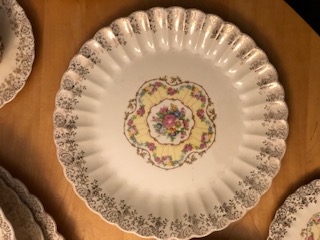Shop Locally to Avoid Becoming a Stepford Wife
Alice Editorial
There is a consignment store in our hometown that has been in the same spot on a corner of Main Street for many, many years. It has served the local population as a swap shop, and, before Walmart rolled into a nearby town, a place where people could find clothing, kitchen wares, jewelry, furniture and sometimes a valuable antique or keepsake at an affordable price. The store served the needs of the locals.
Not too recently, the original owner was forced out by her landlord who began running the store; the first owner couldn’t pay the rent. In the age of Amazon, locals no longer shopped there for substantial goods. They buy new clothes, gadgets, and memorabilia online. No need to visit with neighbors at the local swap. No need to reuse or repurpose goods we once loved and someone else might covet too.
The new owner has reinvented the store’s purpose. It now sells “antiques, furniture, home décor and clothing”. Still a consignment store, the focus is on what the owner wants to sell, rather than what the public needs. No fault there, it is a small business, and it should prosper – if only to keep the downtown core vibrant and relevant. (Even in our small town, the traps of big consumer industrialism rears its ugly head, despite an otherwise engaged citizenry’s good intentions.)
In Wendell Berry’s essay, The Pleasures of Eating, he said, “The specialization of production induces specialization of consumption.” That line sticks out. It is the reason all homes and wardrobes nowadays are the cookie-cutter results of the same anchor stores selling the same shoddy goods to thousands and thousands of consumers who make the lifestyle of a Stepford Wife come true.
Berry said about food consumption, “The current version of the ‘dream home’ of the future involves the ‘effortless’ shopping from a list of available goods on a television monitor and heating precooked food by remote control.” This premise crosses barriers to reflect all consumer choices, and these choices are slowly becoming the norm as an industrialized economy takes the thought and charm out of shopping locally and buying thoughtfully.
As Berry said, “The trap is the ideal of industrialism: a walled city surrounded by valves that let merchandise in but no consciousness out. How does one escape this trap? Only voluntarily, the same way that one went in; by restoring one’s consciousness of what is involved in eating, by reclaiming responsibility for one’s own part in the food economy.” Or rather, by consciously reclaiming responsibility for one’s own part in the local consumer economy.
Now, our once community-centered store has become consumer-centered. When consignments are brought in, the arbiters of good taste are teen-agers with no real historical knowledge of the merchandise, but a clear dictum from the store’s owner. They look at labels, not substance. Again, it is a business, so the rules must apply for it to be solvent, but at what cost to the wellbeing of our “walled city” and its inhabitants?
Recently, after a frenzied cleaning out of closets and cabinets, I brought in a quilt that once covered my baby girls’ bed, and the pricer asked me if it was vintage. I said it was at least 20 years old, in good condition, very clean and could probably be used and enjoyed by someone else. She said, “We don’t take any home goods unless they’re vintage.” I’m still not sure how she defined it, but she didn’t take the quilt. On the same trip, I brought in two sets of dishes to offset the cost of a set I was planning to buy in the shop, thereby taking full advantage of the consignment store design model. Bring in goods; take home goods. Trade and upgrade.
The pricer wouldn’t take them because “dishes don’t sell.” Well, she was right. I didn’t buy the set I was going to buy. Instead, I donated my dishes (along with the quilt) to a thrift store and bought another set there. The profit of which goes to fill the needs of the community, not the pockets of the store’s owner (who earns 60 percent of a purchase from goods that she did not originally buy.)
We may think we’re escaping the Big Box economy by living in a small town, but with the ease and availability of online shopping, or consuming with abandon what the nefarious taste-makers deem we need, we are buying into the industrialist sense of consumerism as surely as our friends and neighbors are all buying all the new iproducts advertised via Amazon during the Super Bowl.
Being disconnected from where our goods come from is the same as tossing them away without care or consequence of where (in which landfill) they end up. As a result, those goods are shoddily made (often under questionable labor practices) and with the full intention of being replaced sooner than later with similarly made disposable materials— a.k.a. planned obsolescence. The disposable economy has replaced the sustainable economy.
It all amounts to waste and disconnection, and outsiders determining our community’s own sense of what is unique and valuable. As consumers (and business owners), we have a duty to support each other, to shop locally, and to cater to the local population. In that way, we support local shops that succeed because they are exercising a business plan that benefits those who sustain their way of life. Reinventing our personal consumption trends will determine the health and prosperity of our community. And most importantly, retain our individuality— the key to not becoming Stepford Wives.
We buy most of our clothing and home goods from consignment shops or online swaps. And that way, our style is unique, our home does not look like everyone else’s, and we can sleep at night knowing we have not contributed to the tremendous waste from which a consumption economy thrives, while destroying our community and our planet.

